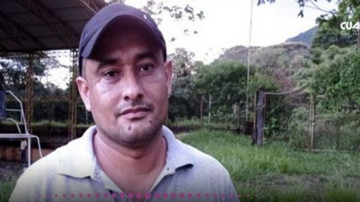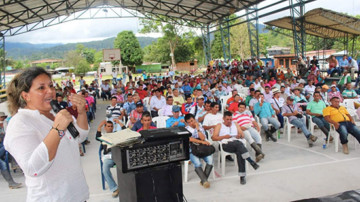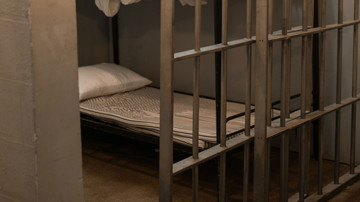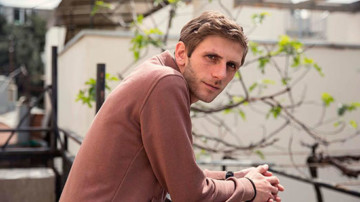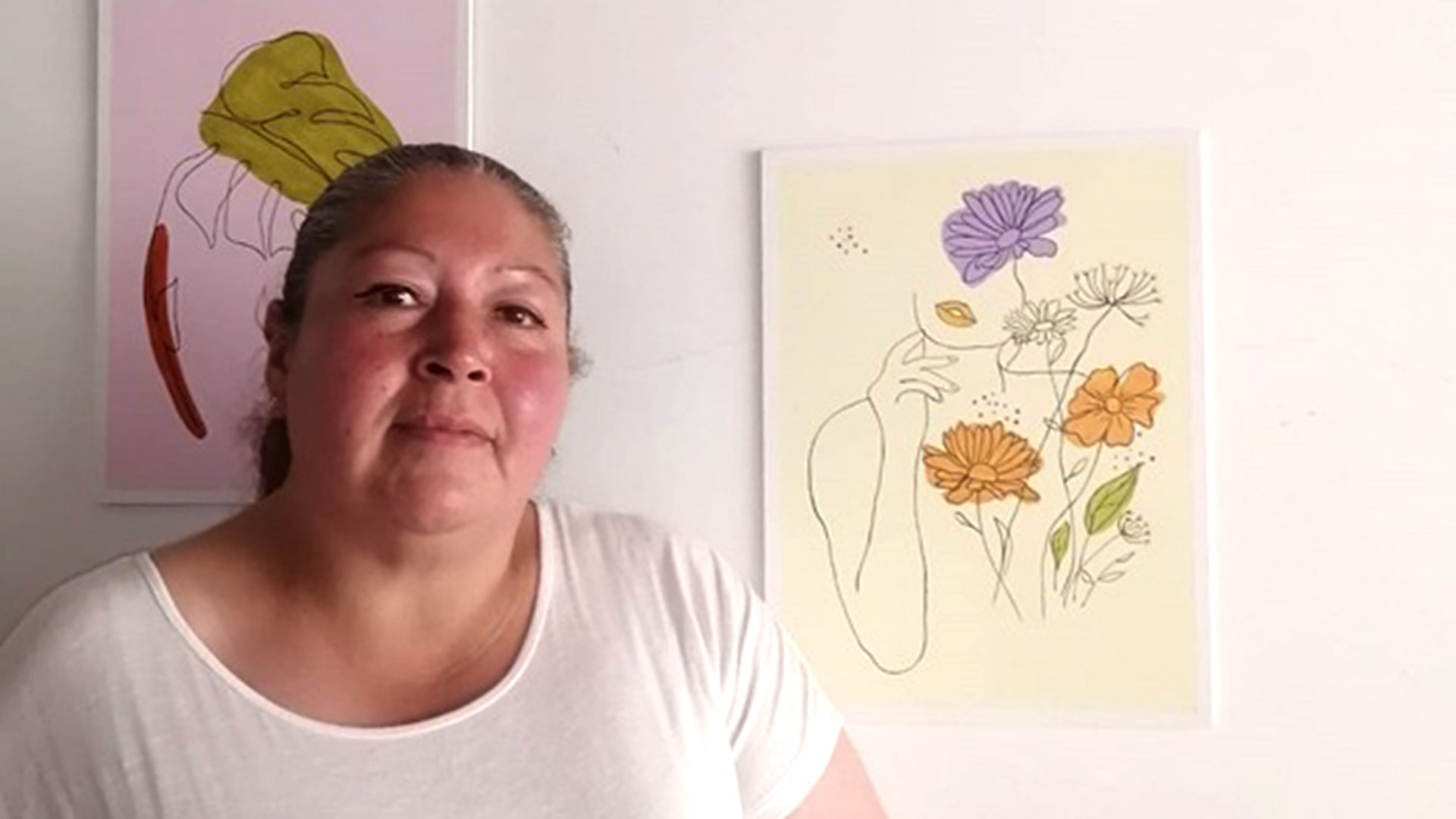
Patricia lived in Kennedy with seven children and an abusive husband. She was desperate, her utilities had been cut off, she was drowning in debt, and she had no money to feed her family.
One day, someone offered her a job that could alleviate her situation, it was presented to her as something easy and she, in the midst of her anguish, accepted. She became a seller of marijuana, cocaine and cocaine base paste.
Indeed, her economic life improved.
On ethical principles, Patricia only sold to adult users, never to children. The profits were enough to live comfortably. The business lasted three years, until the police raided her house. Although she never claimed to be innocent, she claims to be a ‘false positive’ because no evidence of the crime was found in the raid:
They entered my house and raided it, but they didn’t take anything from me. One of the men came out and saw a person with a drug dependency passing by, stopped him, searched him, took two doses from him, and said that’s what I had.
Afterwards, the official and his colleagues took the money she had hung in a bag from the fridge to pay for the utilities and put it on the table as evidence of the crime.
Life in prison and the hustle and bustle
Patricia arrived in June 2010 at the Women’s Prison in Bogotá known as ‘El Buen Pastor’. After spending nearly six months on trial, on 10 November, her birthday, she was sentenced to four years in prison.
When she arrived, the Board decided to send her to the fifth yard, one of the ‘best’ in the prison. At first, she lived with only one other prisoner. Then there was overcrowding, and two more people arrived in her cell and had to sleep on the floor. When Patricia saw that one of them was very ill, she decided to give up her mattress for six months. In her wing, there were only three showers and two toilets for eight cells. At least 32 people had to share two toilets.
The logistics were complicated: the water is cold (the average room temperature in the city is 14°C) and the overcrowding forced them to stand in long lines from early morning to bathe and to receive breakfast, which is served at half past four in the morning.
For some time in the prison there was a problem with the water supply. To make use of it, water had to be bought, each bucket costing between fifteen and twenty thousand pesos. Bathing became a privilege.
In the midst of the contingencies, Patricia found an opportunity to earn money: she heated water and sold it in flasks so that those who wanted could bathe with hot water in exchange for tokens. She also cleaned or picked up breakfast or washed clothes, dried them, folded them, and delivered them clean in exchange for tokens.
For the first six months in prison, Patricia spent all day locked in her yard. Because her trial had not taken place, she was unable to engage in any of the activities scheduled for women to reduce their sentence. The tedium was consuming her, so she decided to talk to the manager of the dressmaking workshop. Patricia recalls that:
Before I was sentenced, I took a weaving course because I told the teacher: ‘Please help me, I don’t want to be in the yard anymore, I want to do something, okay?, they won’t let me do anything, I’m a union member, please help me’. And she, very nice person, told me: ‘well [I’ll help you, but] don’t make me look bad’.
When she was convicted, she was able to get a ‘discount’ on clothing and access to a course at the National Apprenticeship Service (SENA). She learned to sew, but now, outside of prison, this knowledge has not been useful to her because she does not have a sewing machine to work with and because of her background it has been difficult for her to get a job.
Live suddenly lost meaning
On the day she was captured she was going to have dinner with her husband. She did her hair and makeup, but when the police arrived to raid their house, the plans for the evening changed.
When Patricia was in prison, she held out hope that her partner would still be by her side. For the first two months he would visit her, call her, and keep an eye on her, but one Saturday he suddenly stopped coming.
She says that one of her sons made up a lie to ease the frustration and pain caused by the fact that her husband no longer visited her: ‘My dad found a job and he has to go from Sunday to Sunday, so that’s why he can’t come’.
But she suspected that something was wrong. She called one of her friends and she told her that her husband was living with another woman, had abandoned their children, and had taken some of the furniture from their old house.
I cried, I… [as she narrates what she experienced at that moment, she cries again]. Or rather, I almost died. I cried every day […] I wanted to die. In December I got some pills, and I took them, on the 24th. I took Rivotril [clonazepam], I took five pills, I went to the bathroom, I brushed, I went to bed and that was it….
That night, one of her classmates noticed that she was not waking up and although she suspected her suicide attempt, she did not say anything for fear that instead of Patricia being given the necessary attention, they would both be punished. On the morning of the 25th:
They came in to count and I wouldn’t wake up. What happened? Then, ‘La abuela’ [a colleague] went into my cell and told the dragoneantes [supervisors]: ‘oh no, what happened is that I called you last night and you didn’t answer me, and my colleague’s tooth was hurting a lot, and as I use tramadol, I gave her a few drops. I’ve already seen that she’s breathing and everything, I must have overdone it with the drops’. She was my salvation.
The guards warned her as a result:
Next time, let her die of pain or scream a lot or something, otherwise nothing can be done. You can also be affected. What if she dies here or has a heart attack?
At four o’clock in the afternoon, Patricia opened her eyes, still doped up from the medicine. When she felt better, her companion caught her eye:
She told me to think about what a good mum I was, that if that’s what I wanted for my children, to die and leave them alone. That made me feel like a cockroach, the biggest cockroach there is. And she said to me: ‘First you have to try to get out of here, what if you had a report for this? So, I started thinking: ‘No, that’s the only stupid thing I’m going to do here. And I tried to ask for a house arrest, saying that I am the mother of seven children.
But house arrest was denied.
Freedom… under probation
Her lawyer, according to Patricia, swindled her children. They sold everything to pay the fees to a professional who did not even bring the necessary documents to the hearing. In the official document she was given, she recalls that she was denied a house arrest on the grounds that she was ‘unfit to live in society’.
After several years, some legal practitioners helped her to apply for parole, Patricia recalls with emotion:
At the hearing, I went, I went to the front. Then, the judge looked at the biographical booklet and said: ‘well, I give you your parole’. No! I couldn’t believe it. When they told me to sign, to sign my ID card, do you think I remembered how to sign? Do you think I remembered my ID card number?… I was left like… all I did was cry, cry, and cry.
Yes, ma’am, it was my freedom. I couldn’t speak or anything and my legs were shaking, and I went to my cell. A friend of mine arrived and said to me: ‘what happened’. Then I told her: ‘I’m leaving, they gave me my freedom, they gave me my parole’. She was happy for me, but she still had more than 10 years to go.
To get out, Patricia not only had to sign a piece of paper, but she also had to pay for three types of paperwork, an impossible sum for her budget. But fortunately, one of her colleagues, through her lawyer, helped her to meet this expense.
And it came out in November, as she says, it was a birthday present:
To be given freedom, to go out, it’s like being born again, because I think that happiness is incomparable. Everyone said goodbye to me, in fact, they made me a very nice picture, they wrote many nice things. I mean, well, the truth is, it wasn’t all bad and, well, I feel proud because I made a lot of relationships, there are also good people in prison, and well, the truth is that I had like a family there.
Her family was waiting for her with a ‘huge’ bouquet of flowers and a new addition to the family, her grandson, she recalls with emotion:
They took me to where my children were living. And because I was having a birthday, they had rice and chicken for me, I don’t forget that. And everyone was ecstatic and crying. I mean, that was nice.
Her son goes to prison too
After Patricia went to prison and her husband abandoned her children, her sister-in-law lent them a house to live in but sometimes they did not have enough to meet their basic needs: ‘that’s when you wonder who pays more, if you are a mother or your children,’ Patricia says.
Faced with the difficult situation in which they found themselves, Patricia’s son, as a minor, took on the responsibility of taking care of his brothers and sisters. He dedicated himself to stealing to bring food to the house and have a little more to send to his mother.
This year, he has been in prison for three years, one of them in Chiquinquirá. She hasn’t been able to see him there:
‘When he was in the previous one, I went to visit him, but now, imagine, it is very far away and, if I manage to have enough money for the ticket, I don’t have anything to bring him’.
The return
At first, she worked managing a casino at the airport, a job that a friend had arranged for her. She and her family lived very well, the money was enough to rent a flat, eat and even go for walks, but the contract ran out and since then she has not been able to get a stable job.
She had to move to a dangerous neighbourhood on the outskirts of the city, and although she didn’t want to and was very afraid for the safety of her children, the money was no longer enough. She has been living there for a year and, although the rent she pays is not very high, what she earns is not enough to cover her expenses. She has to ‘scrape by’ every day and ask people around her to help her make ends meet.
Restarting from zero. From many zeroes.
Patricia was never prepared to return from prison, as she says, to get out is:
‘to start again, but from zero, from many zeroes. After my release, it felt as if I had been blindfolded; I didn’t know where to go, what to do, and, to be honest, right now I don’t know which doors I have left to knock on.’
She has been unemployed for two years, living on whatever they offer her:
‘I’ve been very unwell and always waiting to see [how I can get what I need to live]. There’s a market where I can buy on credit, but I owe like three shops, and I don’t even have the face to go there. Besides, I haven’t received any money, nothing; so, I cannot pay. At the moment, I’m on the right track, I want to continue like this, but sometimes I start to think and I say, ‘no wonder there are women who go in and out of [the prison]…’
[In prison] you don’t pay rent, they give you food, you don’t pay utilities, nothing, you have everything there. It’s hard to go out on the street because even if you have your period, you don’t have enough to buy a sanitary towel, and here, who are you going to ask for one? Over there, you go to the church, and they give you toilet paper or the other women lend it to you or exchange it for something else.
In fact, Patricia earned more money from the jobs and ‘little hustles’ she had in prison than what she earns now that she is free; the money she earned was enough for her basic needs and to send something to her children.
For all these reasons, Patricia reflects on the need to provide opportunities for those who leave prison so that they do not reoffend:
For example, if you studied tailoring there, you were supported to work. But here it’s as if they were telling us: ‘you’ll see, they’ve already given you your freedom and you have to find your way. There are many people who go out and no one comes to pick them up, and if they are people who use drugs, they go out that same day to use and get lost.
Restaurative justice
Her experience has led her to think about what the academy calls restorative justice:
The truth is that I would really like to see prisons abolished, I would really, really like it. So, I say that as a form of reparation, that the state should look for work for them. For example, if you stole a mobile phone, you should work for the amount of time that it takes to pay it. Or, I don’t know, maybe, I myself could have worked in a rehabilitation centre as a means to respond for what I did.
Stories like Patricia’s reveal the consequences of basing justice on punishment and labelling women who have committed crimes as ‘criminals’ or ‘bad mothers’, ignoring the complexity of their contexts. Before, during and after her imprisonment, Patricia has looked after her children’s wellbeing, has faced high-risk jobs such as selling drugs and has come up with different forms of work to provide her family with minimum survival conditions. But she has come up against a punitive society that prefers to lock her up and isolate her rather than give her the opportunity to work, repair the damage caused, exercise her motherhood, and prevent her children from repeating what she went through.
Photo: Patricia
Patricia’s story was originally compiled by Mónica Lozano, Corporación Humanas. Her story has been translated from Spanish and edited for clarity.
More stories from Colombia
More stories about Proportionality & Criminal Justice

